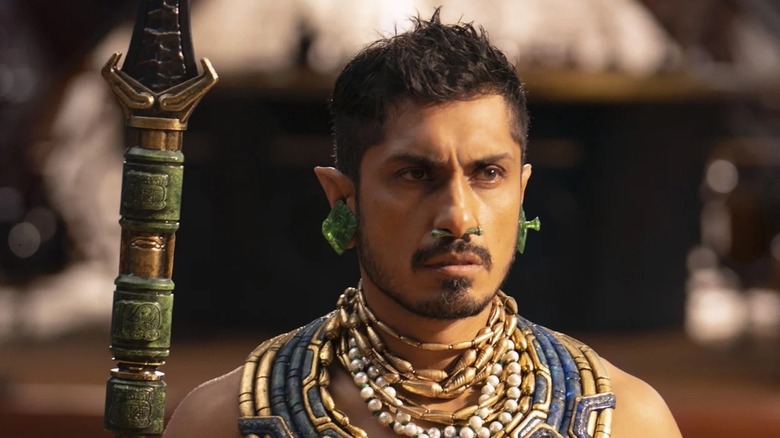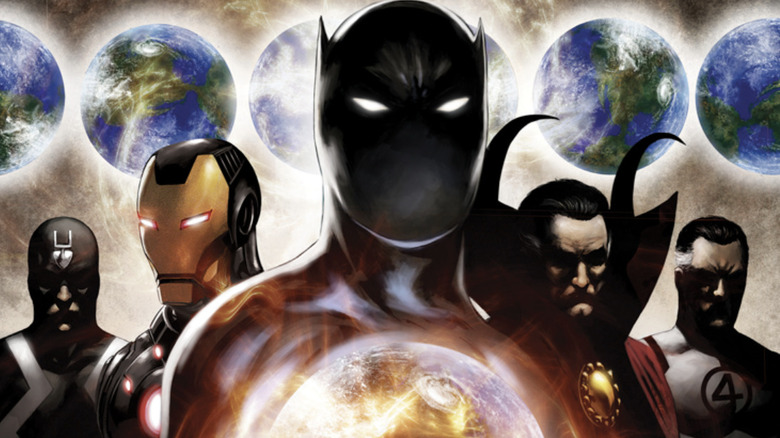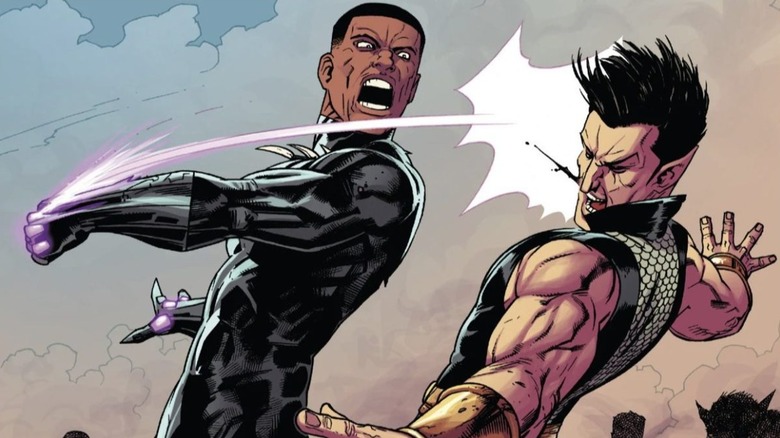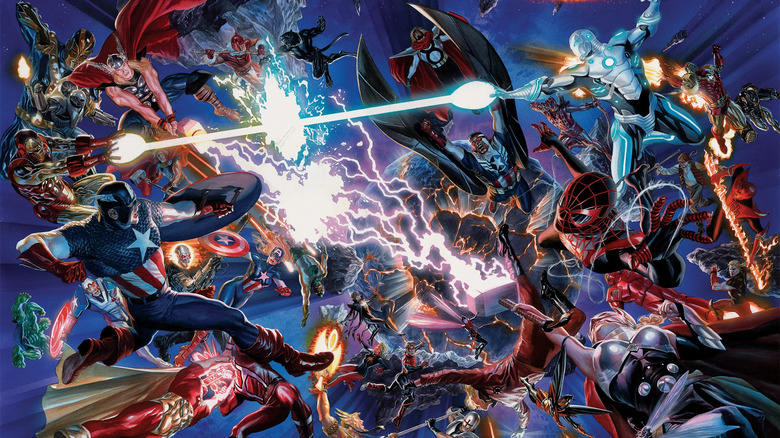Wakanda Forever Isn't The First Time The Black Panther And Namor Have Clashed
If there's a highlight of "Black Panther: Wakanda Forever," it's Namor the Sub-Mariner (Tenoch Huerta Mejía). For the Marvel Cinematic Universe, Namor was reinvented as a man of Mayan descent, with his underwater kingdom renamed from Atlantis to Talokan. He's still just as self-righteous as his comics self, though, and a scarier fighter to boot.
Like Killmonger (Michael B. Jordan) before him, though, one can view Namor as an anti-hero, a man with some good ideas who's going about them in all the wrong way. The MCU has its fair share of such villains, but they all feel half-hearted compared to Killmonger, and now Namor.
Despite his conflict with Wakanda, Namor never had a chance to meet his fellow king, T'Challa (the late Chadwick Boseman). If Marvel fans want to see that conflict, they should check out the comics themselves, especially Jonathan Hickman's run on "The Avengers." This epic centers the two kings and pits them against each other, not as hero or villain, but two flawed kings and foils of the other.
Jonathan Hickman's Avengers
Jonathan Hickman's Marvel Comics epic began during the "Dark Reign" event in 2009, when Norman Osborn was king of the world and superheroes were driven underground. The writer's first ongoing series was "Secret Warriors," about Nick Fury assembling a team of young heroes for covert ops. He then took on "Fantastic Four" and "Ultimates," infusing the latter title with a much-needed boost.
In 2012, he started a new story spread across two ongoing titles: "Avengers" and "New Avengers." In the former, Tony Stark and Steve Rogers decide to expand the roster of Earth's Mightiest Heroes, building an "Avengers World" to combat cosmic threats. However, this is all Stark's distraction from the real threat. In "New Avengers," the Illuminati discover the multiverse is collapsing; during events called Incursions, two parallel Earths collide, taking both universes with them. The conflict, in a nutshell, is superheroes vs. universal entropy.
Even in the crossover events, there are two strains: "Infinity" has the Avengers go off into space to fight the "Builders", the universe's first sentient race. The Illuminati, meanwhile, stay on Earth when Thanos invades. The epic culminates in the 9-part "Secret Wars," which tore down and rebuilt the Marvel universe.
It's a magnificent story, one as good as serialized superhero comics get and which no film can do justice. The story's scope grew to encompass the entire Marvel Universe — and not just Earth-616. Even with such a wide canvas, Hickman did have to pick his favorites. Drawing on his history with the Fantastic Four, he turns Reed Richards and Doctor Doom into his centerpieces; the final clash in "Secret Wars" ultimately comes down to them.
However, the rivalry between T'Challa and Namor over how to handle the incoming apocalypse is also a prominent thread.
Idealism vs Utilarianism
Hickman's "Avengers" begins with T'Challa's experience of the first Incursion in "New Avengers" #1. After witnessing an entire world die, the Black Panther assembles the Illuminati to solve this problem.
It's clear why Hickman sets up T'Challa and Namor as foils. They're both kings of powerful nations, but have very different ruling styles. T'Challa is noble, second only to Captain America as the soul of the Avengers. Namor is proud and has never been shy about challenging those who would threaten him or his people. On the Illuminati, they're the team's superego and id.
As the series goes on, the Illuminati fails to find any solution to the Incursions beyond destroying other worlds. Even if part of kingship is making sacrifices for the greater good, T'Challa can't bring himself to do so. Namor, on the other hand, is willing to stain his hands with the blood of other Earths, provided it saves his own.
This comes to a head in "A Perfect World" (issues #18-23). Earth-616 experiences an Incursion with Earth-4290001 (home to Justice League analogues, "The Great Society.") At the end of issue #21, T'Challa initially offers to activate the detonator that will destroy the other world, but he falters. So, Namor takes it and does it for him.
T'Challa's anger towards Namor finally explodes and the two fight. Namor leaves the Illuminati, convinced they don't have the stones to do what's needed. Instead, he looks for help from Thanos and then, when horrified by the genocidal glee of the Mad Titan's Cabal, Doctor Doom (who refuses: "Doom is no man's second choice.") Namor goes back to the Illuminati, asking for their help in trapping the Cabal on a soon to die world. When the trap is sprung, T'Challa ensures that Namor doesn't escape either.
Onward to Secret Wars
Shuri (Letitia Wright) and Namor's conflict in "Wakanda Forever" is much smaller, but it has the same root: can the needs of the few be sacrificed on the altar of the many? World governments used a Vibranium detector built by Riri Williams (Dominique Thorne) to infringe on Talokan territory. Namor's solution? Kill her and preemptively invade the surface. Shuri, like her brother before her, prefers to keep the peace.
At the film's end, the two and their nations are in a tenuous alliance. We shouldn't expect this to be the end of either relationship onscreen. The MCU is building to "Avengers: Secret Wars," set for 2026. That was the storyline that capped off Hickman's "Avengers" too. During it, T'Challa and Namor were two of the small group of survivors of the universal collapse. They were able to put aside their differences to help defeat Doom. Depending on how closely the eventual film mirrors Hickman and artist Esad Ribic's comic, could the MCU Namor and Shuri (the new Black Panther) reach the same understanding? We'll have to wait and see.



